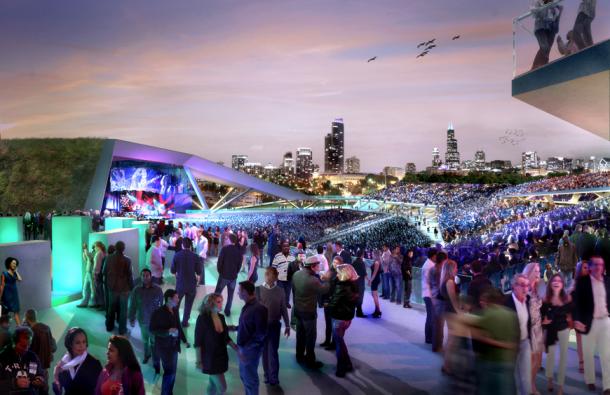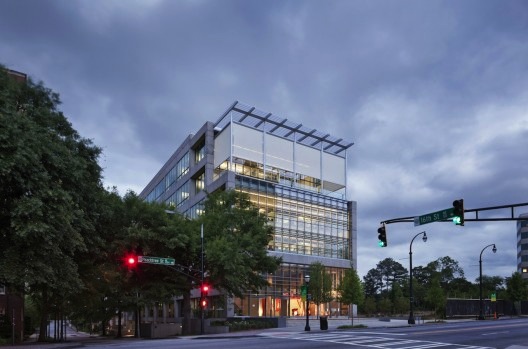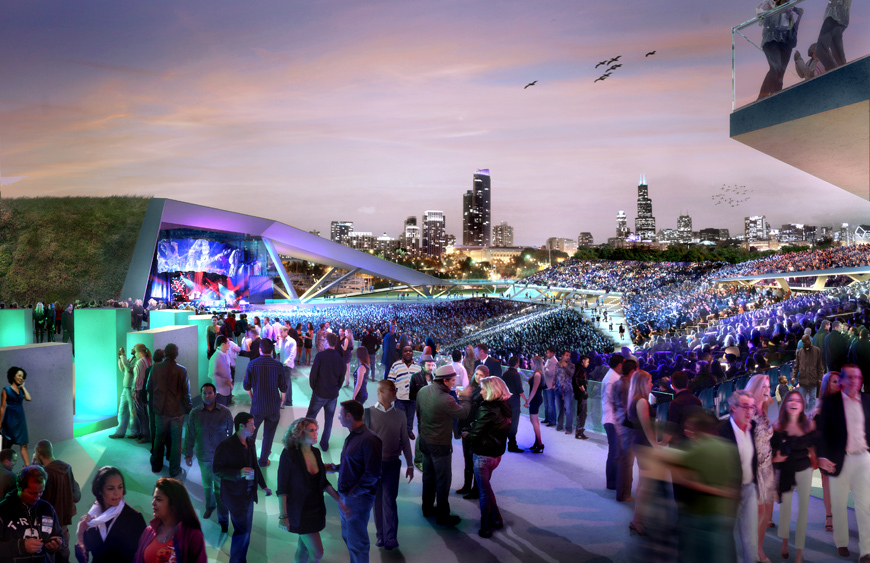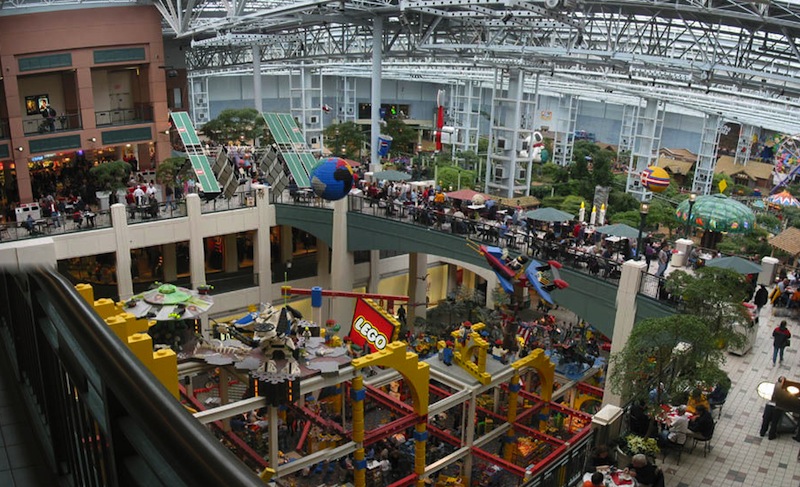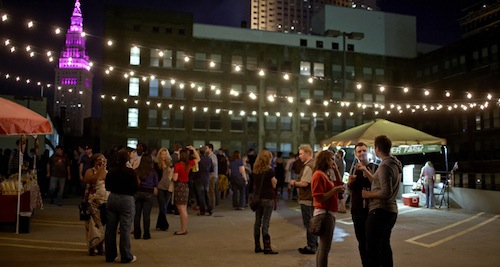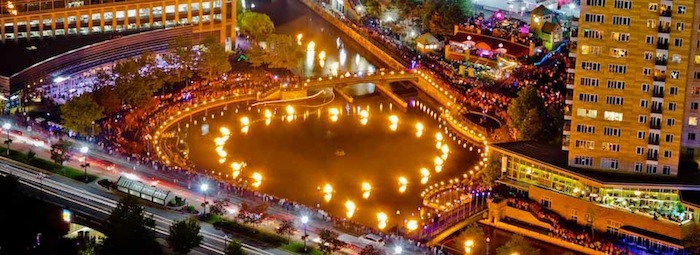An adaptive reuse to create LEED Platinum offices in Georgia, an Ohio park that honors veterans, and a grand national plaza are among the seven projects named winners of the 2013 Great Places Awards. The Environmental Design and Research Association recognize professional and scholarly excellence in environmental design, with special attention paid to the relationship between physical form and human activity or experience.
2013 Place Design Award Recipients
1315 Peachtree Street, Atlanta
Perkins + Will
This LEED Platinum project transformed a 1986 office structure into a "living laboratory" and educational tool for sustainable design. Rigorous research was conducted in pre- and post-occupancy evaluations.
Dublin Grounds of Remembrance
PLANT Architect Inc.
Located in Dublin, Ohio, this one-acre park honors the service of veterans and celebrates the city's heritage. The project examined how architecture can be used to "frame, reveal, and engage the landscape while connecting people to the site and navigating their experience of place." Designers chose not to provide a traditional monument, instead promoting the acts of walking and social gathering.
Place Planning Award Recipients
Northerly Island Park Framework Plan
SmithGroupJJR and Studio Gang Architects
This plan, for an island linked to Chicago's existing lakefront Museum Campus, extends green and sustainable design principles to the waterfont in an ecologically driven plan. The framework establishes zones ranging from urban/active to natural/passive, and includes woodland and waterfront ecology.
Unified Ground: National Mall Competition, Union Square
Gustafson Guthrie Nichol
This plan overlays and enriches the Union Square plaza in the nation's capital with spaces for informal activities. New features and textures respond to the underlying natural landform, daily patterns of movement, and the diverse needs and desires of the users. The plan extends the formal Mall axis to Union Square, including a pool, plaza, and additional pathways.
Place Research Award Recipient
Pop Up City: Temporary Use Strategies for a Sinking City
Cleveland Urban Design Collaborative
Pop Up City is an action-based research program that implements temporary projects as a means of urban reinvention. The research is part of the graduate architecture curriculum at Kent State University, encompassing design-build exercises that culminate in deployment and assessment of temporary projects. (The photo is of Hipp Deck, an outdoor performance venue temporarily created at a parking deck that was once the site of the city's famous Hippodrome Theater.)
Place Book Award Recipient
"Urban Composition," by Mark Childs
This book, which addresses designers but also serves as a teaching tool for urban design, discusses how architects, landscape architects, civil engineers, public artists, city council members, and other participants can caollaborate to create environmentally sound, socially resilient, and "soul enlivening" settlements.
Placemaking Award: Providence
WaterFire Providence
WaterFire Providence, a nonprofit arts organizaton, manages an evolving public art installation of music, floating fires, art, and dance along three rivers in downtown Providence. The project continually changes in response to citizen participation and ongoing expansion of the river park system.
Jurors for the 2013 Great Places Awards:
- Julian Bonder, Principal, Wodiczko + Bonder
- Gayle Epp, Partner, EJP Consulting
- Valerie Fletcher, Executive Director, Institute for Human Centered Design
- Peter M. Hourihan, LEED®AP, Principal & Director of Research, Cannon Design
- Mikyoung Kim, Principal & Design Director, Mikyoung Kim Design.
Related Stories
| Aug 11, 2010
ZweigWhite names its fastest-growing architecture, engineering, and environmental firms
Management consulting and research firm ZweigWhite has identified the 200 fastest-growing architecture, engineering, and environmental consulting firms in the U.S. and Canada for its annual ranking, The Zweig Letter Hot Firm List. This annual list features the design and environmental firms that have outperformed the economy and competitors to become industry leaders.
| Aug 11, 2010
SSOE, Fluor among nation's largest industrial building design firms
A ranking of the Top 75 Industrial Design Firms based on Building Design+Construction's 2009 Giants 300 survey. For more Giants 300 rankings, visit http://www.BDCnetwork.com/Giants
| Aug 11, 2010
Guggenheim to host live online discussion of Frank Lloyd Wright exhibition
The Solomon R. Guggenheim Museum launches the Guggenheim Forum, a new series of moderated online discussions among experts from a variety of fields that will occur in conjunction with major museum exhibitions.
| Aug 11, 2010
Best AEC Firms of 2011/12
Later this year, we will launch Best AEC Firms 2012. We’re looking for firms that create truly positive workplaces for their AEC professionals and support staff. Keep an eye on this page for entry information. +
| Aug 11, 2010
Report: Building codes and regulations impede progress toward uber-green buildings
The enthusiasm for super green Living Buildings continues unabated, but a key stumbling block to the growth of this highest level of green building performance is an existing set of codes and regulations. A new report by the Cascadia Region Green Building Council entitled "Code, Regulatory and Systemic Barriers Affecting Living Building Projects" presents a case for fundamental reassessment of building codes.
| Aug 11, 2010
Call for entries: Building enclosure design awards
The Boston Society of Architects and the Boston chapter of the Building Enclosure Council (BEC-Boston) have announced a High Performance Building award that will assess building enclosure innovation through the demonstrated design, construction, and operation of the building enclosure.
| Aug 11, 2010
Portland Cement Association offers blast resistant design guide for reinforced concrete structures
Developed for designers and engineers, "Blast Resistant Design Guide for Reinforced Concrete Structures" provides a practical treatment of the design of cast-in-place reinforced concrete structures to resist the effects of blast loads. It explains the principles of blast-resistant design, and how to determine the kind and degree of resistance a structure needs as well as how to specify the required materials and details.


